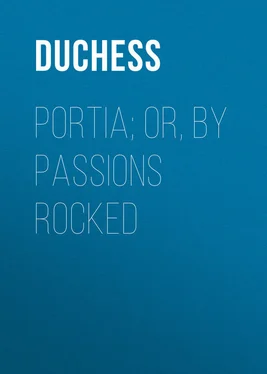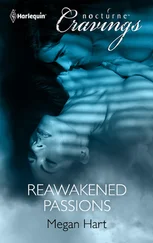Duchess - Portia; Or, By Passions Rocked
Здесь есть возможность читать онлайн «Duchess - Portia; Or, By Passions Rocked» — ознакомительный отрывок электронной книги совершенно бесплатно, а после прочтения отрывка купить полную версию. В некоторых случаях можно слушать аудио, скачать через торрент в формате fb2 и присутствует краткое содержание. Жанр: foreign_antique, foreign_prose, foreign_sf, на английском языке. Описание произведения, (предисловие) а так же отзывы посетителей доступны на портале библиотеки ЛибКат.
- Название:Portia; Or, By Passions Rocked
- Автор:
- Жанр:
- Год:неизвестен
- ISBN:нет данных
- Рейтинг книги:3 / 5. Голосов: 1
-
Избранное:Добавить в избранное
- Отзывы:
-
Ваша оценка:
- 60
- 1
- 2
- 3
- 4
- 5
Portia; Or, By Passions Rocked: краткое содержание, описание и аннотация
Предлагаем к чтению аннотацию, описание, краткое содержание или предисловие (зависит от того, что написал сам автор книги «Portia; Or, By Passions Rocked»). Если вы не нашли необходимую информацию о книге — напишите в комментариях, мы постараемся отыскать её.
Portia; Or, By Passions Rocked — читать онлайн ознакомительный отрывок
Ниже представлен текст книги, разбитый по страницам. Система сохранения места последней прочитанной страницы, позволяет с удобством читать онлайн бесплатно книгу «Portia; Or, By Passions Rocked», без необходимости каждый раз заново искать на чём Вы остановились. Поставьте закладку, и сможете в любой момент перейти на страницу, на которой закончили чтение.
Интервал:
Закладка:
The Boodie (who has not been overdrawn by Dulce and Roger, and who really is like an angel, with her sapphire eyes and corn-colored hair, and the big white bonnet, with its blue bow, that surrounds her face like a cloud) rather loses her presence of mind. It is either this, or a sudden accession of ambition, that overcomes her, because, without a moment's notice, she turns gently on her left heel, and executes a tiny pirouette on her small Hessian boots. A frown from her mother suppresses further evolutions, and, with a sigh, she returns to decorum and the family pew.
In a corner of it the children are comfortably stowed away, while all the others following suit, fall into their proper places. They are only barely in time. The organ plays them up the aisle, and they have only just a second to scramble through the preliminary prayers (so distinct a token of respectability), when the rector's voice breaks forth.
Portia, who has not been to church before, looks up at Mr. Grainger, while he is confessing everybody in a tone severe but bilious, and tells herself he is as like a superannuated old crow as ever he can be. He is flanked by the curate, a mediæval young man, with a pallid countenance and an irreproachable gown, cut in the latest fashion, who stands in an attitude of the most approved, with his eyes fixed immovably upon a side pillar. The fixity of his gaze is so intense as to suggest the idea that he never again means to remove it until death claims him for his own.
Then a hymn is sung by the village choir, led by the organist's high soprano. It is a hymn very unique in its way, and sung with much fervor, if little tune, and pierces even to the brains of its hearers. The organ beats a solemn accompaniment to this delicacy, and whether the strains from the ancient instrument – that squeaks like a dilapidated bagpipes – is too much for the curate, I know not; but, at the last verse, he removes his eyes from the pillar of the church and concentrates them upon Portia.
Portia, at this particular moment, I regret to say, is smiling broadly. A brilliant smile that illuminates her whole face, rendering her as lovely as a dream. She is plainly deriving great consolation from the village choir?
The curate, smitten by the sight of her levity, or by the consciousness of his own lapse from the path of duty, in so far letting his mind wander to mundane matters, turns pale, and, lowering his eyes until they reach the tesselated pavement at his feet, grows sad and thoughtful, and perhaps decides on eating no meat again to-day as punishment for his fault.
The church is old, quaint, curious. It is like a thing forgotten. It looks as if it had been dug up by somebody and planted just here, no one knows why. The windows are narrow and elongated, and admit but little light. The pillars in the more distant corners are wrapt in gloom. A cobweb falling from the roof, spun by some enterprising spider, hangs over the gaunt pulpit, as though desirous of coming in contact with whosoever may enter it.
The cobweb, as it waves lazily backward and forward with every breeze that assails it, is a thing of joy to Roger and Dicky Browne, who are sitting side by side. It is an unspeakable boon, a sweet attraction, an everlasting resource to them throughout the service. As it goes to and fro their eyes follow it; they would willingly bet upon it were such a thing practicable; and they wait in a charmed suspense until such time as some one will enter the pulpit, to see whether the some one will attack the cobweb, or the cobweb attack the some one.
Besides the cobweb there is a clerk and a sexton. Sometimes they say Amen when the idea strikes them; sometimes they don't; it is awkward when they don't . Then a lull in the performance makes itself felt, though it is always somewhat broken by the voice of the curate, which is monotonous in the extreme.
A few stray sunbeams are straggling in through the narrow windows, and are holding high festival in Dulce's bonnet; a perfect crown of glory envelops her head. The day being exceptionally warm, everything and every one is drowsy and sleepy, and a trifle inattentive.
Meanwhile, the service progresses surely, if slowly. Uncle Christopher's head is courting his chest; Fabian, who always sits next to him, is unmistakably wide-awake, but has his head lowered, and his eyes fixed moodily upon the carpet at his feet. He looks attentive, but is really miles away from the Commandments and from everything.
Portia, in her white gown, is looking more than ordinarily lovely, and just now is gazing oddly at Fabian. She is vaguely wondering how he would look if he permitted himself to smile. He is always so preternaturally grave that she is curious to know if a smile – once indulged in – would imbitter or sweeten his face. Yes; Roger was quite right when he said the other day that Fabian's face was perfect. Perhaps even the smile she desires to see upon it could not improve it. Nay, it might even mar it, so severe are its lines; but were they always so? She is lost in impossible speculation!
Dulce, clad all in severe black, with her hands crossed upon her knees, like a small devotee, is looking straight before her at nothing particular, and is utterly unconscious that the strange young man in the "Fens" pew is regarding her with an amount of attention he has certainly not expended on his prayers.
The children have behaved wonderfully well, all things considered. The Boodie has only once laughed out loud, and only twice have Jacky and Pussy indulged in a deadly scuffle; altogether, there is deep cause for thankfulness.
The cobweb is still waving to and fro, and now (as Mr. Grainger ascends the stairs and enters the pulpit), driven, perhaps, by some stronger current of air, moves rapidly to the right, so that the rector reaches his place and arranges himself therein, without coming into collision with it, to Roger's and Dicky's everlasting chagrin.
"A narrow escape," says Dicky, in a careful undertone, to Roger, who, too, has been breathlessly watching the denouement .
"Yes, just like our dismal luck," responds that young man, in an aggrieved tone. "I'd have bet anything on its catching him by the wig."
Mr. Grainger standing up, after a short and private prayer, looks as if he was making his bow to the audience, and having surveyed them leisurely for an embarrassing moment (during which the farmers' wives fidget, and look as if they would gladly inhabit their boots), he gives forth his text.
Silence ensues; the curate arranges himself in a purely ascetic attitude; the rector stamps his foot, in a preparatory sort of way, on the floor of the massive pulpit, which is as hideous as it is clumsy to the last degree. There are a few meagre little carvings all round it, suggestive of tares, and wheat, and good Samaritans, and there is an impossible donkey in the foreground. It is a very depressing pulpit, but certainly solid.
"No chance of a breakdown," says Roger, gloomily, fixing, his eye-glass in his left eye, and surveying with ill concealed disgust the unwieldy structure before him.
"You're a brave boy," returns Mr. Browne, with exaggerated admiration. "Fancy your looking for excitement here ."
"It may be nearer than you think," says Roger, so meaningly, that his companion applies himself to the translating of his glance. It is fixed, and fixed on the cobweb, too, which is slowly, slowly floating towards the rector's head. It comes nearer to it, catches in a rising lock (that has elevated itself, no doubt, because of the preacher's eloquence), and lingers there, as though bent on lifting pulpit, Grainger and all to the ceiling with the next puff of wind.
Roger forgets his grievance, his ennui , everything! The situation has its charm. To his delight he finds Dicky as wrapt in the possible result as himself. The cobweb sticks fast. Mr. Grainger, lifting his hand, smooths his ear, under the mistaken impression that the ticking feeling is there, and then goes on solemnly with his discourse, which is dryer than the weather, which is saying a good deal. He moves his head impatiently from side to side, but gains nothing by this, as the cobweb is apparently of an affectionate disposition, and goes with him wherever he listeth.
Читать дальшеИнтервал:
Закладка:
Похожие книги на «Portia; Or, By Passions Rocked»
Представляем Вашему вниманию похожие книги на «Portia; Or, By Passions Rocked» списком для выбора. Мы отобрали схожую по названию и смыслу литературу в надежде предоставить читателям больше вариантов отыскать новые, интересные, ещё непрочитанные произведения.
Обсуждение, отзывы о книге «Portia; Or, By Passions Rocked» и просто собственные мнения читателей. Оставьте ваши комментарии, напишите, что Вы думаете о произведении, его смысле или главных героях. Укажите что конкретно понравилось, а что нет, и почему Вы так считаете.












